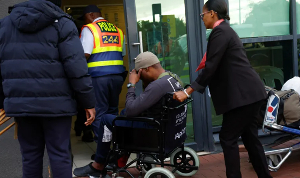Takoradi (W/R), July 5, GNA- The Adum-Banso Youth Association has called on the government to return the land on which the Benso Oil Palm Plantation (BOPP) is situated to the Adum-Banso Stool if it wants to divest the company.
At a press conference in Takoradi on Friday, Mr Tony Nyame, General Secretary of the Association said the land was compulsory acquired from the Stool by the Supreme Military Council (SMC) to establish BOPP in Partnership with Unilever Ghana Limited. He said the SMC paid compensation on economic trees and settlements to few farmers but paid nothing for the acquisition of the land.
Mr Nyame said no government after the SMC paid anything to the Adum-Banso Stool in respect of the land for the past 27 years. He said the government could not hold its shares in the company because the land, which it was using as equity for its partnership with Unilever, belongs to the Adum-Banso Stool. He said the hints recently given by the Minister of Finance that the government was considering selling its 40 per cent shares in BOPP is not acceptable because it was not in the best interest of the people of the area. "The government has no moral or legal rights to take the land freely and sell it to outsiders", he said. "If it had lost interest in the company, the best option for it is to return it to the land owners who are prepared to partner with BOPP using the land as equity".
Mr Nyame said the community wants the government to make available to it, 15 per cent of the dividend she earns from BOPP annually for developmental purposes and to appoint a native of the area to serve on the board of directors of the company. He said government could only float its shares or any part of it, if it fully pays for the present value of the land, which was equivalent to 40 per cent shares in the company. He said the acquisition of the BOPP land, which was used for agriculture, had brought untold hardships to the people in the area including social tension.
Regional News of Saturday, 5 July 2003
Source: GNA
Adum-Benso Youth wants land returned to Stool
Entertainment











